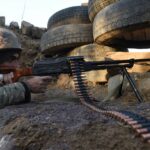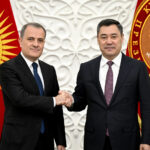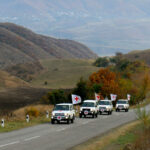Much of the focus is on expanding economic cooperation and advancing plans to establish pan-regional transportation links, such as the North-South railroad corridor connecting India to Russia via Iran and Azerbaijan.
Such efforts should be welcomed and encouraged as improving the collective economic well-being of the South Caucasus region is to the benefit of all regional states. That said, underlying geopolitical tensions are still a factor and can derail attempts at economic integration at any moment. In this context, the Iranian-Turkish competition for influence in the South Caucasus is the most pressing issue that needs to be managed.
Iran’s Turkey fears
From Tehran’s point of view, Azerbaijan’s victory in the 2020 war against Armenia could not have been achieved without Turkish and Israeli support and a Russian inability to prevent Armenia’s defeat. In this Iranian reading, Baku has been emboldened and views “its military-diplomatic strategy [as] vindicated.” This includes its decision to select Turkey and Israel as its primary foreign partners.
From Tehran’s perspective, this sense of policy vindication in Baku presents its own challenges. Israel is, after all, Iran’s top regional rival. Since the mid-1990s the Iranians have had to engage in a delicate balancing act not to let the close military-security cooperation between Baku and Jerusalem scuttle Tehran’s preference to maintain cordial relations with Azerbaijan.
It is, however, Iranian concerns about Turkish plans to expand its influence in Azerbaijan and the broader South Caucasus that could spark fresh tensions and lead to a new chapter in the region’s history. In short, Tehran fears that Ankara’s strategy to cement relations with Baku is a policy that rests heavily on a pan-Turkic message that aims to capitalize on the shared language, history, and culture of Turkic speakers that live across a vast region from Turkey across northern Iran to the Caucasus and Central Asia and all the way to China.
It is exactly pan-Turkism that the Iranians are most anxious about. Meanwhile, Russia, which has its own significant Turkic minorities and shares Iran’s fears about pan-Turkism, has a weakened hand in the region thanks to its invasion of Ukraine and the adverse ramifications this has had on Moscow’s ability to continue to play its historic role as a powerbroker in the South Caucasus.
There are no official data but around 20% of Iran’s population of 85 million people are ethnic Azerbaijanis. This is a community that is deeply integrated in the fabric of the Iranian nation, and there is no sign of large-scale secessionist tendencies. Nonetheless, officials and analysts in Tehran remain hugely sensitive to this issue, and particularly any Turkish aspirations to incite Iran’s Azerbaijanis in any upsurge in Iranian-Turkish tensions.
Along this line of thinking, the argument often heard from Iranian officials is that the Turkish-Azerbaijani understanding to utilize the pan-Turkic card against Iran is wholeheartedly supported by Israel. Tehran’s charge against Baku is that it provides “safe havens” to ethnic Azerbaijani secessionists from Iran, an accusation that President Ilham Aliyev has roundly rejected. In any event, with Russia consumed by its war in Ukraine, some in Tehran expect that Ankara and Baku will expand their support for pan-Turkism, and this will invariably put them on a collision course with Tehran.
Iran, Turkey, and the transit race
This Iranian-Turkish competition in the South Caucasus also has economic dimensions. Iranian officials have long maintained that the country’s central location allows it to serve as a land bridge for transit routes connecting West Asia to both Europe and East Asia. This is a reality no one can deny if one looks at the map. What can also not be denied is that the U.S. and Israel have opposed and continue to oppose Iran’s involvement in pan-regional projects that will benefit it economically.
In return, Tehran has done next to nothing to look for ways to reduce such opposition since doing so would require reorienting its overall foreign policy and reducing tensions with the U.S. and Israel. Instead, Tehran’s focus has been on countries, such as Turkey, that look to benefit from Iran’s inability to function as a regional hub for trade and transit.
While the Iranians recognize their shortcomings, they have been slow to act to rectify the situation. This lack of momentum is something that Tehran should already be regretting when one looks at the speed with which Turkey is moving ahead to make itself the regional transit hub for the whole of West Asia, including the South Caucasus and Central Asia. Accordingly, Turkey’s recent efforts, including the unveiling of plans to link up with Central Asia via the Caspian Sea, are viewed as a direct challenge to Iranian interests.
Take for example Turkey’s “Trans-Caspian East-West-Middle Corridor Initiative,” which Ankara also refers to as “The Middle Corridor.” This links Turkey to the Caucasus via Georgia and Azerbaijan and then via a sea link crosses the Caspian Sea to Central Asia and China. Turkish marketing calls this a “revival” of the Silk Road, which is a falsehood since the historic Silk Road travelled through what is now Iran.
A sub-component of such Turkish efforts is the “Turkey-Georgia-Azerbaijan-Turkmenistan-Afghanistan Transit Corridor Agreement,” also known as the “Lapis Lazuli Agreement.” Again, the net loser in the development of a route connecting Central Asia and Afghanistan to the Black and Mediterranean seas is Iran, which will see itself locked out of a possibly important regional transit network. It will also put Iran’s trade ties with Afghanistan and the Central Asian states at risk since more trade flows will mean more competition for the same export markets that Tehran presently depends on.
Despite such realities, Iran is still slow in acting. In Tehran, the relevant bureaucracy in relation to regional trade and transit policy needs to be overhauled and simplified. In one case in October 2021, when two Pakistani trucks with goods transited through Iran to Turkey, they faced considerable bureaucratic delays at the border — delays that were only resolved after mediation by senior customs officials in Tehran. The incident revealed a broken system that is not attractive to international trade on a large scale. Iran also needs to sign bilateral and multilateral transit agreements with neighbors and beyond for it to become a primary transit route.
Options ahead
In short, Iran and Turkey are presently engaged in a subtle but deeper competition for influence in the South Caucasus, including in the realm of possible new transit projects. The Iranians know that the removal of sanctions is critical to their ability to become a regional transit hub. This is a source of income that Iran would welcome. The revenue from each ton of goods transiting through Iran is reportedly the same as that from each barrel of oil exported.
But Tehran’s predicament is larger than an inability to turn its geography into a source of income by becoming a transit hub. Despite recent efforts by Baku and Tehran to focus on mutually advantageous economic cooperation when possible, there is a need for broader political dialogue. Above all, Iran needs to do more to tout the constructive role it can play as a mediator between Azerbaijan and Armenia.
There is no doubt that Tehran was blindsided by the 44-day war between Armenia and Azerbaijan in late 2020 over control of the disputed territory of Nagorno-Karabakh. The Iranians were equally shocked by the extent of the involvement of Turkey and Israel during the fighting and in the aftermath of the cease-fire that was brokered by Moscow but where Ankara was — unlike Tehran — a party to the negotiations.
As Iran’s former Foreign Minister Javad Zarif put it in January 2021, Tehran’s intention is to look for different means by which regional countries can “work together to help the Nagorno-Karabakh crisis [to come to an end] and [improve] the situation of peace and stability.” This is what the Iranians and the Turks have referred to as the “six-party union” among Armenia, Azerbaijan, Georgia, Iran, Russia, and Turkey. Only time will tell if Iran can recover any lost ground in the South Caucasus, but there is no question in Tehran today that Iran has been too neglectful of the significance of the region for its geostrategic and economic interests.
Alex Vatanka is the director of MEI’s Iran Program and a senior fellow with the Frontier Europe Initiative.










